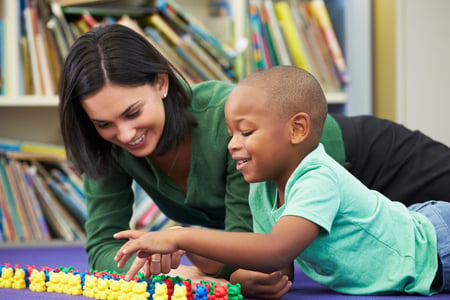
We’ve written before about the discipline disparities between children of color and their white peers. (Since that post was published last year, the Department of Education has released updated - but not improved - statistics on the topic.) But discipline is not the only school arena where children from different backgrounds have different experiences. There’s also evidence that racial bias affects teachers’ academic and behavioral expectations, even in early childhood.
No matter how well-intentioned we may be, our biases affect how we see and build relationships with others - and teachers are no exception. That’s why a 2017 article by J. Luke Wood, Idara Essien, and Darielle Blevins examined the “D-Three Effect” in kindergarten. According to the authors, “this effect assumes that teachers inherently view Black boys and men through the lens of distrust, disdain, and disregard.”
To check for the effect in kindergarten classrooms, researchers used a large dataset (the ECLS-K: 2011) that contains information on 8,790 kindergarten boys. They examined several rating scales intended to evaluate social-emotional skills and relationships: the Student-Teacher Relationship Scale (STRS), the Social Skills Rating Scale (SSRS), and the Children’s Behavior Questionnaire (CBQ). All of these rely on teachers’ perceptions of their students. Based on the D-Three Effect, researchers hypothesized that teachers would show more concern over Black boys’ challenging behaviors and social skills, which would in turn affect their relationships.
In their analysis, the researchers found that Black boys were perceived as having more externalized problem behavior - actions like defiance, fighting, and yelling - than other male kindergarteners. It’s important to note that these are not documented differences in behavior, just teachers’ perceptions of students. Their perceptions are intertwined with their relationships with children, which were significantly and meaningfully different for Black boys than their peers.
Teachers rated their closeness with Black students lower than their closeness with children of other races/ethnicities, and they characterized their relationships as having more conflict. Boys of all races/ethnicities with stronger social skills were closer to their teachers, but externalizing behavior had a larger negative effect on teacher-child relationships for Black and Hispanic/Latino boys than for others.
Because this wasn’t a causal study, we can’t say definitively why this is. However, the authors point out that their findings are in line with the D-Three Effect: feelings of distrust, disdain, and disregard certainly seem unlikely to foster close and conflict-free relationships. Given the importance of these teacher-child relationships and how they affect learning, it’s essential to create classrooms that are welcoming, inclusive, and actively anti-bias. That’s the first of several steps that have to be taken if we hope to create an education system that supports our country’s children of color - and the future they represent.
Citation: Wood, J.L., Essien, I., & Blevins, D. (2017). Black males in kindergarten: The effect of social skills on close and conflictual relationships with teachers. Journal of African American Males in Education, 8(2). 30-50.

